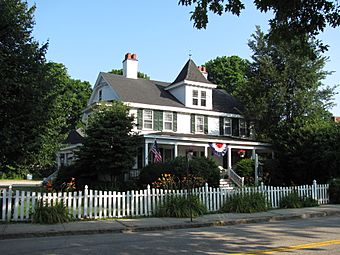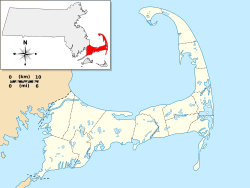Falmouth Village Green Historic District facts for kids
Quick facts for kids |
|
|
Falmouth Village Green Historic District
|
|

Village Green Inn
|
|
| Location | Falmouth, Massachusetts |
|---|---|
| Architect | Vaughan, Henry; Olmsted, Frederick Law |
| Architectural style | Georgian, Federal, Late Victorian |
| NRHP reference No. | 96000271 |
| Added to NRHP | March 27, 1996 |
The Falmouth Village Green Historic District is a special area in Falmouth, Massachusetts. It's like a time capsule showing the town's history. This district is centered around a triangular village green, which is a grassy open space. Main Street, West Main Street, and Hewins Street form its edges. The district also goes south on Locust Street to the Old Town Cemetery.
This area has been the heart of Falmouth since 1756. Many buildings here show the styles of the late Colonial and Federal periods. The district was added to the National Register of Historic Places in 1996. This means it's recognized as an important historical site.
Contents
Falmouth's Early Days and the Village Green
Falmouth was first settled around 1660. It became its own town, separate from Barnstable, in 1686. The town's first center was about 0.75 miles (1.2 km) south of where the green is now.
Moving the meeting house (a building used for both church and town meetings) to this spot in 1756 caused a lot of discussion. This move led to new houses being built along Locust Street. This street connected the new town center to the south coast. Seven houses from that early period still stand near the meeting house.
Important Buildings and History Museums
A key part of the district is the Museums on the Green. The Falmouth Historical Society owns and runs these museums. They include two historic houses and an exhibit center. Here, you can learn all about Falmouth's past. The museums are surrounded by beautiful gardens, cared for by the Falmouth Garden Club.
The First Congregational Church, built in 1796, was originally on the green itself. In 1858, it was moved to the north side of the green. Its bell tower holds a bell made by the famous Paul Revere. The village green is still a popular spot for town events and gatherings today.
How Falmouth Grew and Changed
Falmouth started as a farming community. But in the late 1700s and early 1800s, activities related to the sea became very important. Many people worked in shipping or fishing.
Between the 1850s and 1870s, several houses in the Italianate style were built. These homes were often owned by ship captains or others involved in sea trades. Later buildings in the district show how Falmouth changed around the early 1900s. It became a popular place for summer vacations. An example is the Queen's Buyway, built in 1925. It's a group of shops on Palmer Avenue designed in the Colonial Revival style.
Gallery
 | May Edward Chinn |
 | Rebecca Cole |
 | Alexa Canady |
 | Dorothy Lavinia Brown |











